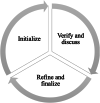Tailored implementation of internet-based cognitive behavioural therapy in the multinational context of the ImpleMentAll project: a study protocol for a stepped wedge cluster randomized trial
- PMID: 33115545
- PMCID: PMC7592568
- DOI: 10.1186/s13063-020-04686-4
Tailored implementation of internet-based cognitive behavioural therapy in the multinational context of the ImpleMentAll project: a study protocol for a stepped wedge cluster randomized trial
Abstract
Background: Internet-based Cognitive Behavioural Therapy (iCBT) is found effective in treating common mental disorders. However, the use of these interventions in routine care is limited. The international ImpleMentAll study is funded by the European Union's Horizon 2020 programme. It is concerned with studying and improving methods for implementing evidence-based iCBT services for common mental disorders in routine mental health care. A digitally accessible implementation toolkit (ItFits-toolkit) will be introduced to mental health care organizations with the aim to facilitate the ongoing implementation of iCBT services within local contexts. This study investigates the effectiveness of the ItFits-toolkit by comparing it to implementation-as-usual activities.
Methods: A stepped wedge cluster randomized controlled trial (SWT) design will be applied. Over a trial period of 30 months, the ItFits-toolkit will be introduced sequentially in twelve routine mental health care organizations in primary and specialist care across nine countries in Europe and Australia. Repeated measures are applied to assess change over time in the outcome variables. The effectiveness of the ItFits-toolkit will be assessed in terms of the degree of normalization of the use of the iCBT services. Several exploratory outcomes including uptake of the iCBT services will be measured to feed the interpretation of the primary outcome. Data will be collected via a centralized data collection system and analysed using generalized linear mixed modelling. A qualitative process evaluation of routine implementation activities and the use of the ItFits-toolkit will be conducted within this study.
Discussion: The ImpleMentAll study is a large-scale international research project designed to study the effectiveness of tailored implementation. Using a SWT design that allows to examine change over time, this study will investigate the effect of tailored implementation on the normalization of the use of iCBT services and their uptake. It will provide a better understanding of the process and methods of tailoring implementation strategies. If found effective, the ItFits-toolkit will be made accessible for mental health care service providers, to help them overcome their context-specific implementation challenges.
Trial registration: ClinicalTrials.gov NCT03652883 . Retrospectively registered on 29 August 2018.
Keywords: Determinants of practice; Implementation strategies; Internet-delivered Cognitive Behavioural Therapy; Mental health; Normalization; SWT; Stepped wedge trial design; Tailored implementation; eHealth; iCBT.
Conflict of interest statement
Professor Bruno Aouizerate has received honoraria or consulting fees from Janssen-Cilag, Lundbeck, and Lilly. Dr. Samalin has received grants, honoraria, or consulting fees from Janssen-Cilag, Lundbeck, and Otsuka. All other authors declare that they have no competing interests.
Figures





References
-
- Ebert DD, Van Daele T, Nordgreen T, Karekla M, Compare A, Zarbo C, Kaehlke F. Internet and mobile-based psychological interventions: Applications, efficacy and potential for improving mental health. A report of the EFPA E-Health Taskforce (vol 23, pg 167, 2018) Eur Psychol. 2018;23(3):269. doi: 10.1027/1016-9040/a000346. - DOI
-
- Lindefors N, Andersson G, editors. Guided Internet-based treatments in psychiatry. Cham: Springer International Publishing; 2016.
-
- Karyotaki E, Riper H, Twisk J, Hoogendoorn A, Kleiboer A, Mira A, et al. Efficacy of self-guided internet-based cognitive behavioral therapy in the treatment of depressive symptoms a meta-analysis of individual participant data. JAMA Psychiatry. 2017;74(4):351–359. doi: 10.1001/jamapsychiatry.2017.0044. - DOI - PubMed
Publication types
MeSH terms
Associated data
Grants and funding
LinkOut - more resources
Full Text Sources
Medical

